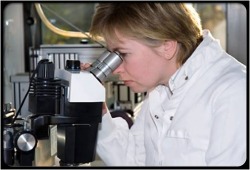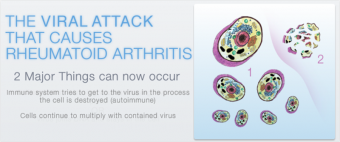Rheumatoid Arthritis
Searching for the Cause of Rheumatoid Arthritis
Courtesy: Orthopedics.About

Scientists still do not know exactly what causes the immune system to turn against itself in rheumatoid arthritis, but research over the last few years has begun to piece together the factors involved.
Genetic (inherited) factors: Scientists have discovered that certain genes known to play a role in the immune system are associated with a tendency to develop rheumatoid arthritis. Some people with rheumatoid arthritis do not have these particular genes; still others have these genes but never develop the disease. These somewhat contradictory data suggest that a person's genetic makeup plays an important role in determining if he or she will develop rheumatoid arthritis, but it is not the only factor. What is clear, however, is that more than one gene is involved in determining whether a person develops rheumatoid arthritis and how severe the disease will become.
Genetic (inherited) factors: Scientists have discovered that certain genes known to play a role in the immune system are associated with a tendency to develop rheumatoid arthritis. Some people with rheumatoid arthritis do not have these particular genes; still others have these genes but never develop the disease. These somewhat contradictory data suggest that a person's genetic makeup plays an important role in determining if he or she will develop rheumatoid arthritis, but it is not the only factor. What is clear, however, is that more than one gene is involved in determining whether a person develops rheumatoid arthritis and how severe the disease will become.
Environmental factors: Many scientists think that something must occur to trigger the disease process in people whose genetic makeup makes them susceptible to rheumatoid arthritis. A viral or bacterial infection appears likely, but the exact agent is not yet known. This does not mean that rheumatoid arthritis is contagious: a person cannot catch it from someone else.

Other factors: Some scientists also think that a variety of hormonal factors may be involved.
Scientists think that levels of the immune system molecules interleukin 12 (IL-12) and tumor necrosis factor-alpha (TNF-á) may change along with the changing hormone levels seen in pregnant women. This change may contribute to the swelling and tissue destruction seen in rheumatoid arthritis. These hormones, or possibly deficiencies or changes in certain hormones, may promote the development of rheumatoid arthritis in a genetically susceptible person who has been exposed to a triggering agent from the environment.
Even though all the answers are not known, one thing is certain: rheumatoid arthritis develops as a result of an interaction of many factors. Researchers are trying to understand these factors and how they work together.
- Women are more likely to develop rheumatoid arthritis than men,pregnancy may improve the disease, and the disease may flare after a pregnancy.
- Breastfeeding may also aggravate the disease.
- Contraceptive use may alter a person's likelihood of developing rheumatoid arthritis.
Scientists think that levels of the immune system molecules interleukin 12 (IL-12) and tumor necrosis factor-alpha (TNF-á) may change along with the changing hormone levels seen in pregnant women. This change may contribute to the swelling and tissue destruction seen in rheumatoid arthritis. These hormones, or possibly deficiencies or changes in certain hormones, may promote the development of rheumatoid arthritis in a genetically susceptible person who has been exposed to a triggering agent from the environment.
Even though all the answers are not known, one thing is certain: rheumatoid arthritis develops as a result of an interaction of many factors. Researchers are trying to understand these factors and how they work together.

